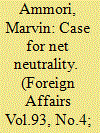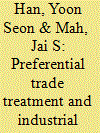| Srl | Item |
| 1 |
ID:
151100


|
|
|
|
|
| Summary/Abstract |
Protective policies are essential for individual development and group mobility.
Positive discriminatory efforts seek to reduce group inequalities and to rectify
the consequences of group discrimination. Reservations in the fields of politics,
education and employment aimed at protecting tribal culture and tradition have
achieved strikingly little. Protection of land and life support system has been
poorly implemented. There have been no marked improvements in their social
conditions. Planned intervention has not improved the occupational and educational
levels of tribals. Non-tribals do not treat them equally. Apart from developing
entrepreneurship, follow-up action in providing developmental benefits to
tribals should be made. The single-stroke formula of providing loans and facilities
is unsuited to the development needs of the area. Social capital formation
is needed to ensure justice, or to provide socio-economic justice, which was
traditionally present in the tribal economy and society.
|
|
|
|
|
|
|
|
|
|
|
|
|
|
|
|
| 2 |
ID:
132128


|
|
|
|
|
| Publication |
2014.
|
| Summary/Abstract |
For all the withering criticism leveled at the White House for its botched rollout of HealthCare.gov, that debacle is not the biggest technology-related failure of Barack Obama's presidency. That inauspicious distinction belongs to his administration's incompetence in another area: reneging on Obama's signature pledge to ensure "net neutrality," the straightforward but powerful idea that Internet service providers (ISPs) should treat all traffic that goes through their networks the same. Net neutrality holds that ISPs shouldn't offer preferential treatment to some websites over others or charge some companies arbitrary fees to reach users. By this logic, AT&T, for example, shouldn't be allowed to grant iTunes Radio a special "fast lane" for its data while forcing Spotify to make do with choppier service.
|
|
|
|
|
|
|
|
|
|
|
|
|
|
|
|
| 3 |
ID:
131496


|
|
|
|
|
| Publication |
2014.
|
| Summary/Abstract |
International organizations (IOs) suffuse world politics, but the International Monetary Fund (IMF) stands out as an unusually important IO. My research suggests that IMF lending is systematically biased. Preferential treatment is largely driven by the degree of similarity between beliefs held by IMF officials and key economic policy-makers in the borrowing country. This article describes the IMF's ideational culture as "neoliberal," and assumes it to be stable during the observation window (1980-2000). The beliefs of top economic policy-makers in borrowing countries, however, vary in terms of their distance from IMF officials' beliefs. When fellow neoliberals control the top economic policy posts the distance between the means of the policy team's beliefs and the IMF narrows; consequently, IMF loans become less onerous, more generous, and less rigorously enforced. I gathered data on the number of conditions and the relative size of loans for 486 programs in the years between 1980 and 2000. I collected data on waivers, which allow countries that have missed binding conditions to continue to access funds, as an indicator for enforcement. I rely on indirect indicators, gleaned from a new data set that contains biographical details of more than 2,000 policy-makers in ninety developing countries, to construct a measure of the proportion of the top policy officials that are fellow neoliberals. The evidence from a battery of statistical tests reveals that as the proportion of neoliberals in the borrowing government increases, IMF deals get comparatively sweeter.
|
|
|
|
|
|
|
|
|
|
|
|
|
|
|
|
| 4 |
ID:
138504


|
|
|
|
|
| Summary/Abstract |
The garment industry is important for Cambodia’s economy not only because it generates noticeable export earnings and employment, but also because it contributes significantly to the economic growth of the country. Due to the bilateral trade agreements that exist between Cambodia and the USA, the majority of Cambodia’s garment exports are destined for the US market. The European Union (EU) has also given preferential treatment to Cambodia’s export of garments and this is expected to lead to an increase in the volume of Cambodia’s export of garments to the EU. Thus, the case of Cambodia indicates that preferential treatment by developed countries may contribute significantly to the export expansion and economic growth of a developing country. In terms of foreign direct investment (FDI) inflows, China has played a leading role. China’s investment in Cambodia’s garment industry has enabled a strengthening of production capacity.
|
|
|
|
|
|
|
|
|
|
|
|
|
|
|
|